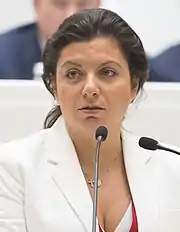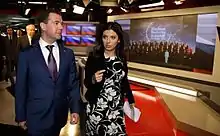Margarita Simonyan
Margarita Simonovna Simonyan (Russian: Маргари́та Симо́новна Симонья́н; born 6 April 1980) is a Russian journalist and the editor-in-chief of the English-language television news network RT (formerly Russia Today)[1] and of the state-owned international news agency Rossiya Segodnya.[2]
Margarita Simonyan | |
|---|---|
 Simonyan in 2017 | |
| Born | Margarita Simonovna Simonyan April 6, 1980 |
| Citizenship | Russian |
| Alma mater | Kuban State University |
| Occupation | journalist, editor-in-chief of RT and Rossiya Segodnya |
| Years active | 1999–present |
| Website | RT |
Biography
Early life
Simonyan was born in the southern Russian city of Krasnodar, into an Armenian family.[3] Both of her parents are descendants of Armenian refugees from the Ottoman Empire. Her father's family, originally from Trabzon, settled in Crimea during the Armenian Genocide of 1915. During World War II, they were deported by Beria's NKVD to the Urals along with thousands of other Hamshen Armenians. While her father was born in Yekaterinburg (Sverdlovsk), her mother was born in Sochi to an Armenian family that had fled the massacres of the Armenians by the Turks in the late 19th century.[4] Her family owns a restaurant in Moldovka town in Adlersky City District, Sochi.[5] She is from a working-class family and decided at an early age she wanted to become a journalist. She first worked for the local newspaper, and then for a local television station while studying journalism at Kuban State University.[6]
In 1996, Simonyan spent a year in Bristol, New Hampshire, as part of Future Leaders Exchange student exchange program.[1][7] She says during that time she discovered Russians and Americans "are so much alike in terms of culture, in terms of family values, ways of life, reactions, sense of humor".[6][8]
Career
Simonyan covered the Second Chechen War and serious flooding in Russia's south for her local television station, receiving an award for "professional courage". In 2002, she became a regional correspondent for Russia's national Rossiya television channel and covered the 2004 Beslan school hostage crisis.[9] Simonyan, one of the first journalists to arrive at the scene, witnessed the killing of 334, 186 of them children. She told an interviewer "It was the worst thing that ever happened to me," and that she cried frequently while trying to write about it. She then moved to Moscow and joined the Russian pool of Kremlin reporters.[6][8]
She was the first Vice-President of the Russian National Association of TV and Radio Broadcasters and a member of The Civic Chamber of the Russian Federation. In 2010, her first book, Heading to Moscow! was published.[1][10]
Editor-in-chief of RT and Rossiya Segodnya

Simonyan was only 25 when appointed editor-in-chief of RT (then known as Russia Today) in 2005, but had been working in journalism since she was 18.[11] She stated in a 2008 interview that "her age often leads people to make assumptions about how she got her job." Andrei Richter, the director of the Moscow Media Law and Policy Institute and a journalism professor at Moscow State University, suggests that she was "appointed because she is well-connected."[11] Some sources describe her as a Kremlin loyalist[12] who is close to President Vladimir Putin.[13][14][15][16] She admits that Putin once sent her flowers.[11] When asked about the flowers incident Simonyan explained, "At a press conference, where President Putin was talking with the President of Tajikistan. It was my twenty-fifth birthday, which is a special anniversary. The other journalists were talking about it, the President heard them, and that was how I received the flowers. It was very spontaneous. I don’t think that you can call it a presidential high regard".[17] Simonyan has explained to reporters that after the fall of the Soviet Union many older Soviet journalists were not wanted by new media enterprises which preferred less experienced young journalists, thus the youth of most of the staffers.[8][11]
RT (then known as Russia Today) began broadcasting on 10 December 2005 with a staff of 300 journalists, including approximately 70 from outside Russia.[18] Simonyan frequently addresses media questions about RT's journalistic and political stands. At its launch, Simonyan stated that RT's intent was to have a "professional format" like the BBC, CNN and Euronews that would "reflect Russia's opinion of the world" and present a "more balanced picture" of Russia.[19] She also told a reporter that the government would not dictate content and "Censorship by government in this country is prohibited by the constitution."[20] She later told The Moscow Times that RT started to grow once it became provocative and that controversy was vital to the station. She said that RT's task was not to polish Moscow's reputation.[21] The station has however been criticised repeatedly in the west for perceived bias. Symonyan has been quoted as saying: "There is no objectivity – only approximations of the truth by as many different voices as possible".[22]
She discussed her views of RT's coverage of the 2008 South Ossetia war, where Russia backed South Ossetia against the country of Georgia, with The Washington Times. She stated that among English speaking channels, only RT was giving the South Ossetian side of the story. She rejected the allegation of Will Dunbar, an RT correspondent who left after alleging RT was downplaying Russian bombing raids, and denied his claims of censorship. She stated that compared to some other stations, "We are not making a secret out of the fact that we are a Russian station, and, of course, we see the world from a Russian point of view. We are being much more honest in that sense."[8]
On 31 December 2013, she was cross-appointed as editor-in-chief of the new government owned news agency Rossiya Segodnya and serves as editor-in-chief of both organizations concurrently.[2]
In May 2016, she was included in the sanctions list of Ukraine by President Petro Poroshenko, she was denied entry to Ukraine.[23]
Personal life
Simonyan was formerly married to the journalist and producer Andrey Blagodyrenko, giving birth to the couple's daughter, Mariana, in August 2013.[24]
In September 2014, Margarita gave birth to a son Bagrat, whose father is a Russian-Armenian film director Tigran Keosayan.[25] Simonyan wrote the script for Crimean Bridge: Made with Love! (2018), a film directed by Keosayan, to whom she is now married.[26]
Simonyan is fluent in Russian and English. She stated in a 2012 interview that she regrets not knowing Armenian, but explained that it is because her family never spoke Armenian at home due to dialectal differences.[4]
Critics
During the 2020 Armenian–Azerbaijani skirmishes she expressed a sharp opinion, accusing the Armenian authorities of provoking Russia by arresting former-president Robert Kocharyan and refusing to recognize the invasion of Crimea. She suggested that the CSTO’s response was appropriate given Armenia’s “anti-Russian sentiment.” CSTO later stated that “The opinion of [Simonyan] is completely contrary to the official position of the CSTO Secretariat.”[27] Her words were widely criticized in the Armenians society.[28] Political commentator Sergey Parkhomenko also criticized her, saying that Simonyan is posing as "a powerful representative of the Armenian people, while not being such at all from any point of view."[29]
On November 30, 2020, Simonyan, as editor in chief of state-owned RT, defended a TV segment that was roundly criticized as racist, in which her partner Tigran Keosayan and an actress in blackface exchanged dialogue about former United States President Barack Obama such as: “Do you consider this book your achievement?” (referring to Obama's book A Promised Land)... “Of course,” the blackface actress replied... “Because none of your relatives have written books?” Keosayan asked... “Because none of my relatives that came before me could write.” [30][31]
Awards and honors
- Order of Friendship (2007)[32]
- Movses Khorenatsi medal (2010)[33]
- Order For Merit to the Fatherland 4th class (2014)[34]
See also
References
- Margarita Simonyan biography Archived 2012-06-21 at the Wayback Machine, NewsExchange.org, accessed September 20, 2012.
- "RT editor Simonyan to head Kremlin-backed news agency". BBC News. 31 December 2013. Retrieved 31 December 2013.
- "МАРГАРИТА СИМОНЬЯН". Echo of Moscow. 4 March 2013. Retrieved 8 October 2013.
- "Armenians of the World-Margarita Simonyan" (in Armenian). Shant TV. 6 February 2012. Retrieved 23 March 2014. (archived)
- "30 January 2014 tweet" (in Russian). Twitter. Retrieved 2 February 2014.
Диар френдз , если вы уже в Сочи и хотите ОЧЕНЬ вкусно поесть, напоминаю про наш семейный ресторан 'Жарко!' - Молдовка, Костромская, 133.
- Ioffe, Julia (September–October 2010). "What is Russia Today?". Columbia Journalism Review.
- "20 years of FLEX" (PDF). Future Leaders Exchange. 2012. Archived from the original (PDF) on 2014-10-06. Retrieved 2014-10-03.
- Rowland, Kara (October 27, 2008). "Russia Today: Youth served". The Washington Times.
- Zagorodnov, Artem (September 25, 2008). "Today's woman who needs to be heard". The Moscow Times.
- Margarita Simonyan book event photographs Archived 2013-02-23 at the Wayback Machine, Ria Novosti media library.
- Heyman, Stephen (18 May 2008). "A Voice of Mother Russia, in English". New York Times. Retrieved 24 March 2014.
- Elder, Miriam (25 January 2012). "WikiLeaks founder Julian Assange's TV show to be aired on Russian channel". The Guardian.
- Barry and Schwirtz, Ellen and Michael (6 May 2012). "Arrests and Violence at Overflowing Rally in Moscow". New York Times.
- Ioffe, Julia (September–October 2010). "What is Russia Today?". Columbia Journalism Review.
- Walker, Shaun (14 December 2011). "Why the Russian revolution is being televised at last".
- Osborn, Andrew (August 16, 2005). "Russia's 'CNN' wants to tell it like it is". The Age.
- Russia Today is the face of Russia today (interview with Margarita Simonyan passportmagazine.ru January 2007
- Julian Evans, Spinning Russia, Foreign Policy, December 1, 2005.
- RIA Novosti launches a TV channel, Russia Today, RIA Novosti, June 7, 2005.
- Beth Knobel "Russian News, English Accent: New Kremlin Show Spins Russia Westward", CBS News, 12 December 2005
- "Russia Today courts viewers with controversy". The Moscow Times. March 23, 2010.
- "The Guardian view on Russian propaganda: the truth is out there". Guardian. Retrieved 3 March 2015.
- Порошенко ввёл санкции к главам российских СМИ: Эрнст, Симоньян, Гусев // Московский комсомолец
- Alperina, Susanna (12 August 2013). Маргарита Симоньян родила дочь Марьяну. Rossiyskaya Gazeta (in Russian). Retrieved 23 March 2014.
- Елена ЛАПТЕВА, Сайт «Комсомольской правды» (27 September 2014). "Тигран Кеосаян и Маргарита Симоньян назвали сына Багратом". kp.ru. Retrieved 17 March 2018.
- "Crimea bridge backdrop for Russian 'propaganda' rom-com". France 24. AFP. 6 November 2018. Retrieved 19 April 2020.
- Elliott, Raffi (July 22, 2020). "Armenian forces repel yet another Azerbaijani assault in Tavush". The Armenian Weekly.
- "Russia Today, Sputnik head accuses Armenian gov't of being anti-Russian". July 19, 2020.
- Сергей Пархоменко, Суть событий, 24 ИЮЛЯ 2020, Эхо Москвы
- O'Grady, Siobhán; Dixon, Robyn. "Pro-Kremlin TV ridicules Obama with blackface skit" – via www.washingtonpost.com.
- "Obama Blackface Skit on Kremlin-Funded TV Sparks Outrage". The Moscow Times. November 30, 2020.
- ""Консультант Плюс" - законодательство РФ: кодексы, законы, указы, постановления Правительства Российской Федерации, нормативные акты". lib.consultant.ru. Retrieved 17 March 2018.
- LLC, Helix Consulting. "President Sargsyan met in Moscow with a number of representative of public and cultural circles of the Armenian community - Press releases - Updates - The President of the Republic of Armenia [the official site]". www.president.am. Retrieved 2017-09-22.
- "СМИ: 300 журналистов получили от Путина награды за Крым". Archived from the original on March 21, 2017.
External links
- Margarita Simonyan biography, IBC (International Broadcasting Convention) website, accessed September 20, 2012.
- Margarita Simonyan at LiveJournal
 (in Russian)
(in Russian) - Margarita Simonyan on Facebook
 (in Russian)
(in Russian) - Margarita Simonyan on Twitter
 (in Russian)
(in Russian)